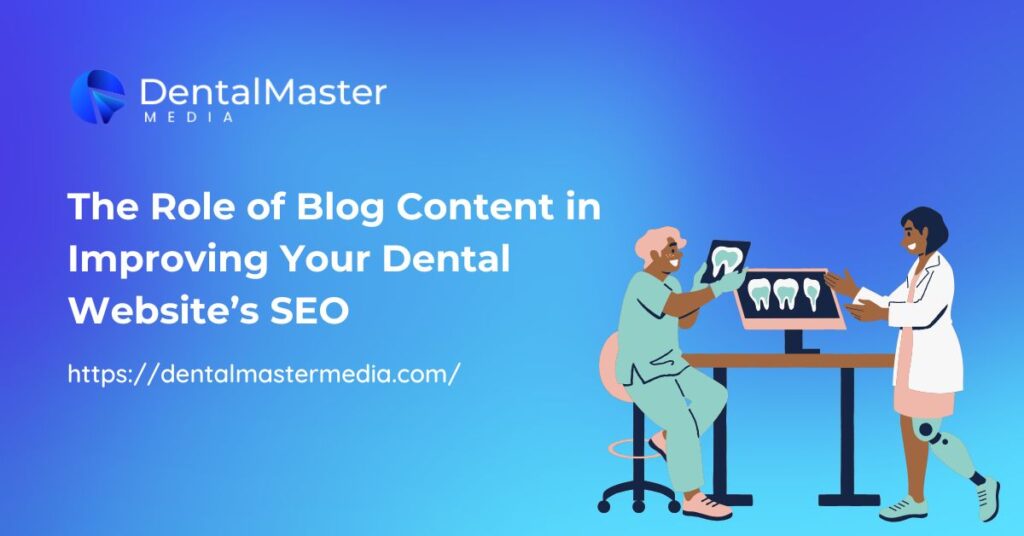In today’s digital world, a well-designed dental website is just the beginning. If you want to attract new patients and keep your schedule full, you need to be visible where people are searching: online.
One of the most powerful tools to improve your online visibility is a blog. High-quality blog content can significantly boost your dental website’s SEO, helping you rank higher on search engines like Google and reach more potential patients.
Let’s explore how blog content contributes to your dental SEO strategy and what you can do to make your blog work harder for your practice.
Why Blog Content Matters for Dental SEO
Search engines aim to provide users with the most relevant and useful content. To achieve this, they constantly crawl websites, looking for fresh, informative, and keyword-rich content.
A static website with only a few pages won’t provide enough content for search engines to keep indexing. That’s where a blog comes in. Blogging allows you to continuously add fresh content to your website.
Each post is a new opportunity to target keywords, answer patient questions, and demonstrate your expertise. This ongoing activity signals to search engines that your website is active, trustworthy, and worth ranking—something a skilled dental SEO company can help you implement effectively.

Here are several reasons why blog content is critical to improving your dental SEO:
1. Helps Target Long-Tail Keywords
When people search for dental services, they often use long, specific phrases, like “best dentist for root canal” or “how to treat gum disease at home.” These are known as long-tail keywords. They may have lower search volume compared to general terms like “dentist,” but they’re much easier to rank for and often indicate a user with strong intent.
Blogs are the perfect place to target long-tail keywords. Each post can be tailored around a specific question or concern your patients might have. For example:
- “What to Expect After Wisdom Tooth Removal”
- “5 Signs You Need a Dental Crown”
- “How Laser Dentistry Can Help with Gum Disease”
By optimizing blog posts for these kinds of keywords, you increase your chances of appearing in search results when potential patients are looking for specific dental advice or treatments.
2. Increases Time Spent on Site
Google considers how long visitors stay on your site as one of many signals of quality. A blog filled with engaging, informative content encourages visitors to stick around, read more, and explore your services.
For example, someone searching for “what causes sensitive teeth” might find your blog post answering that question. If the content is helpful, they might continue reading about treatments you offer or even contact your office for an appointment. This increased time-on-site can positively influence your rankings.
3. Builds Topical Authority and Trust
When you regularly publish well-researched, accurate, and educational blog posts, you position yourself as a knowledgeable and trustworthy expert. Over time, this builds your topical authority—one of the key elements search engines use to rank content.
If Google recognizes that your site consistently publishes valuable content about dental health, it’s more likely to rank your pages higher when someone searches for related topics. This makes blogging a long-term investment in your online reputation.
Additionally, quality blog content helps build trust with human visitors. Patients are more likely to choose a dentist who provides helpful advice and clearly explains treatments and procedures.
4. Encourages Internal and External Linking
Blogs naturally provide opportunities for internal linking, which helps search engines understand your site structure and guides users to important pages. For instance, a blog post about dental implants can link to your service page on implants or your “Book an Appointment” page.
Blogs also make it easier to earn backlinks—links from other websites—which are one of the most powerful ranking factors in SEO. When other websites reference your informative blog post, Google sees this as a vote of confidence and may reward your site with higher rankings.
Of course, earning backlinks requires that your content be genuinely helpful and original. Think detailed guides, patient education, and unique perspectives on common dental issues.
5. Gives You Content to Share on Social Media and Newsletters
Creating fresh blog content gives you something to share on social media and in email newsletters. Sharing blog posts not only drives traffic to your website but also sends social signals to search engines, which may contribute to improved rankings.
Incorporating dental SEO strategies into your content ensures that each post is optimized for maximum visibility.
By staying active on social platforms with educational blog content, you also increase your chances of being shared by others, further expanding your reach and improving your website’s SEO footprint.
6. Supports Local SEO
Most dental practices rely on local patients. Blogging can support your local SEO efforts by targeting location-based keywords and answering questions specific to your region. Examples include:
If you’re trying to attract local traffic through your dental blog, consider writing posts that address specific patient needs and geographic areas. For example, a blog titled “How to Find a Good Dentist” can help you connect with people searching for quality care in your community.
Similarly, a post like “Top Family Dental Clinics” can position your practice as a trusted choice for families seeking comprehensive dental services. You can also educate readers by publishing helpful guides such as “What You Need to Know About Dental Insurance”, which addresses common concerns about coverage and costs.
These location-specific and informative blog posts not only improve your SEO but also build trust with prospective patients.
Adding local context to your blog posts helps your website rank for geo-targeted searches and makes your content more relevant to the people who are most likely to become your patients.
7. Keeps Your Website Fresh and Updated
Search engines love fresh content. Regular blog updates show Google that your site is active and maintained, which can contribute to better rankings.
Without a blog, your website may remain unchanged for months—or even years. That kind of stagnation can hurt your SEO. A blog keeps your content dynamic, current, and more attractive to both search engines and visitors.
Tips to Maximize the SEO Value of Your Dental Blog
Not all blog content is created equal. To get the most from your blogging efforts, follow these proven tips:
1. Focus on Quality Over Quantity
Avoid churning out short, generic blog posts just to fill space. Instead, aim for well-written articles that provide real value to your audience. Ideally, each post should be at least 800–1,200 words and offer practical advice or insights.
2. Use Keywords Strategically
Include relevant keywords in your title, headers, and throughout your content—but do it naturally. Don’t overstuff keywords, or you risk being penalized by search engines.
3. Optimize Meta Titles and Descriptions
Each blog post should have a unique meta title and description that includes your primary keyword. This helps improve your click-through rates from search results.
4. Add Internal Links
Link to other relevant blog posts and pages within your website. This helps keep visitors on your site longer and improves navigation.
5. Include Visuals
Use images, infographics, and videos to make your content more engaging and easier to understand. Be sure to include alt text for SEO.
6. End With a Call to Action (CTA)
Encourage readers to take the next step, whether it’s scheduling a consultation, reading another post, or signing up for your newsletter.
Blog Topics That Attract Dental Patients
If you’re wondering what to write about, consider topics that resonate with your audience and support your SEO goals. For example, you can share dental hygiene tips for kids and families, explain the differences between crowns, veneers, and fillings, or guide readers through what to expect during a root canal procedure.
Posts discussing the pros and cons of teeth whitening treatments, debunking myths about braces and Invisalign, or highlighting the benefits of laser dentistry can be both educational and engaging.
Additionally, addressing emotional topics like how to overcome dental anxiety or identifying common signs of gum disease can help build trust with potential patients.
These types of blog posts tackle real patient concerns, offer valuable insights, and naturally include keywords that improve your search engine visibility.
Why Blogging Is an Essential Part of SEO for Dentists
While there are many tactics involved in digital marketing, blog content remains one of the most effective strategies for improving visibility, increasing traffic, and attracting new patients. Whether you’re just starting out or trying to grow an established practice, blogging should be a key part of your SEO for Dentists strategy.
Done correctly, it builds authority, enhances the user experience, and increases your chances of ranking high on Google. Best of all, it keeps you connected to your audience and positions your practice as the go-to expert in your area.
Conclusion
If you’re serious about growing your dental practice, investing time and effort into blog content can pay long-term dividends.
It’s not just about writing for the sake of it—it’s about providing real value to your potential patients while signaling to search engines that your website deserves to be seen.
A consistent, keyword-optimized, and patient-focused blog strategy can be the difference between a website that gets lost in the crowd and one that generates steady, qualified leads month after month.
Start by publishing one blog per week, focusing on topics your patients care about. Over time, your content library will grow, your rankings will improve, and your practice will reap the rewards.

Suraj Rana is the owner of Dental Master Media and a leading expert in SEO for dental practices. With a passion for dental marketing, he has successfully helped numerous dental clinics climb the search engine ranks. Suraj’s expertise makes him a go-to resource for effective, results-driven dental marketing.

